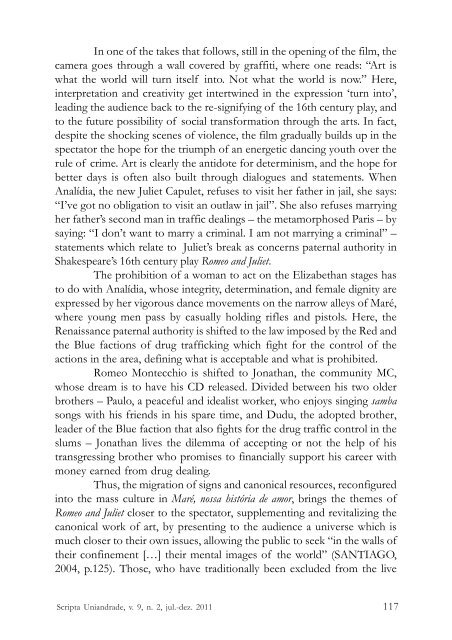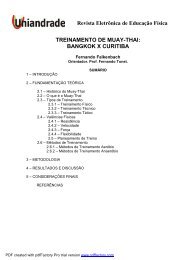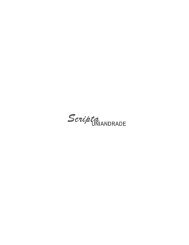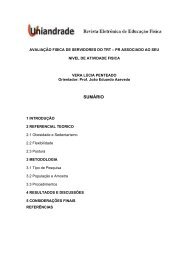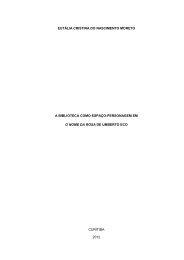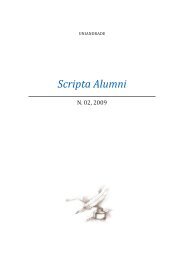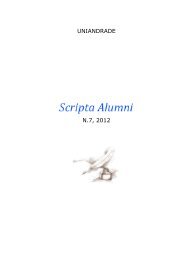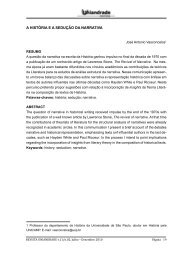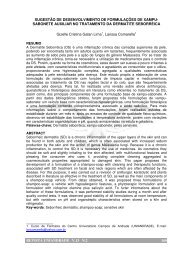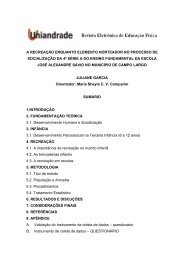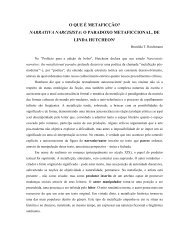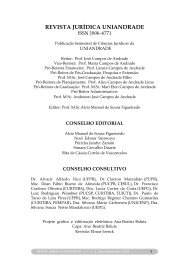Scripta 9_2_link_final.pdf - Uniandrade
Scripta 9_2_link_final.pdf - Uniandrade
Scripta 9_2_link_final.pdf - Uniandrade
You also want an ePaper? Increase the reach of your titles
YUMPU automatically turns print PDFs into web optimized ePapers that Google loves.
In one of the takes that follows, still in the opening of the film, the<br />
camera goes through a wall covered by graffiti, where one reads: “Art is<br />
what the world will turn itself into. Not what the world is now.” Here,<br />
interpretation and creativity get intertwined in the expression ‘turn into’,<br />
leading the audience back to the re-signifying of the 16th century play, and<br />
to the future possibility of social transformation through the arts. In fact,<br />
despite the shocking scenes of violence, the film gradually builds up in the<br />
spectator the hope for the triumph of an energetic dancing youth over the<br />
rule of crime. Art is clearly the antidote for determinism, and the hope for<br />
better days is often also built through dialogues and statements. When<br />
Analídia, the new Juliet Capulet, refuses to visit her father in jail, she says:<br />
“I’ve got no obligation to visit an outlaw in jail”. She also refuses marrying<br />
her father’s second man in traffic dealings – the metamorphosed Paris – by<br />
saying: “I don’t want to marry a criminal. I am not marrying a criminal” –<br />
statements which relate to Juliet’s break as concerns paternal authority in<br />
Shakespeare’s 16th century play Romeo and Juliet.<br />
The prohibition of a woman to act on the Elizabethan stages has<br />
to do with Analídia, whose integrity, determination, and female dignity are<br />
expressed by her vigorous dance movements on the narrow alleys of Maré,<br />
where young men pass by casually holding rifles and pistols. Here, the<br />
Renaissance paternal authority is shifted to the law imposed by the Red and<br />
the Blue factions of drug trafficking which fight for the control of the<br />
actions in the area, defining what is acceptable and what is prohibited.<br />
Romeo Montecchio is shifted to Jonathan, the community MC,<br />
whose dream is to have his CD released. Divided between his two older<br />
brothers – Paulo, a peaceful and idealist worker, who enjoys singing samba<br />
songs with his friends in his spare time, and Dudu, the adopted brother,<br />
leader of the Blue faction that also fights for the drug traffic control in the<br />
slums – Jonathan lives the dilemma of accepting or not the help of his<br />
transgressing brother who promises to financially support his career with<br />
money earned from drug dealing.<br />
Thus, the migration of signs and canonical resources, reconfigured<br />
into the mass culture in Maré, nossa história de amor, brings the themes of<br />
Romeo and Juliet closer to the spectator, supplementing and revitalizing the<br />
canonical work of art, by presenting to the audience a universe which is<br />
much closer to their own issues, allowing the public to seek “in the walls of<br />
their confinement […] their mental images of the world” (SANTIAGO,<br />
2004, p.125). Those, who have traditionally been excluded from the live<br />
<strong>Scripta</strong> <strong>Uniandrade</strong>, v. 9, n. 2, jul.-dez. 2011 117


